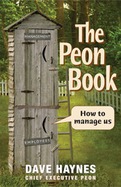The Peon Book
How to Manage Us
David Haynes (Author) | Dave Haynes (Author)
Publication date: 04/01/2004
- Not written by an "expert"-learn from a living, breathing employee what does and doesn't work to get him motivated and productive
- Funny, irreverent, fast moving, and written in a direct, in-your-face style
- Packed with real-life examples that show the actual, sometimes unintended, effects of management actions on employees
Management books are traditionally written by industry "experts": scholars, consultants, senior managers. They're writing about how to manage workers, but none of these experts really understands the viewpoint of the average worker, the regular grunt in the trenches-the peon. Peons are the ones affected when a manager decides to manage-in-one-minute, to move somebody's cheese, to try that fifth discipline. Rather than consult some expert, why not go to the source, and ask the peons? Who better to teach you how to train a dog than the dog himself? And who better to tell you how to manage than one of those who are being managed? The Peon Book gives managers the perspective they've been lacking. Author and self-proclaimed Chief Executive Peon Dave Haynes' sole, powerful source of expertise is that he has been managed in different companies and in different industries, and he knows what worked-and what failed catastrophically. In irreverent, straight-talking terms, Haynes tells managers what they really need to do to make their employees motivated, committed, and productive-and it's not memorizing yet another "technique" or "strategy" or "discipline." Haynes writes in a common sense, easy-to-read style that is both witty and wise. Every boss can benefit, and every employee can empathize with the words in The Peon Book. "The inability to empathize can be a real speed bump on the road to a trusting, personal relationship with your employees. So how are you supposed to show more empathy? I take issue with management books that give you a phrase to say to show empathy like 'I understand,' or 'I know what you mean,' or that say that by rephrasing a statement you can show empathy. Don't use some coined phrase to show empathy, just mentally put yourself in our shoes. Sometimes it's just a matter of remembering what it's like to have to get all those reports turned in on a Friday. Or remembering what it's like to have to ask for time off. Or remembering what it's like to be the new guy on the job, and have a hard time remembering everything. Do you see the key concept I'm getting at? Empathy = remembering. Who said you'd never use math in the real world?"
- Not written by an "expert"-learn from a living, breathing employee what does and doesn't work to get him motivated and productive
- Funny, irreverent, fast moving, and written in a direct, in-your-face style
- Packed with real-life examples that show the actual, sometimes unintended, effects of management actions on employees
Find out more about our Bulk Buyer Program
- 10-49: 20% discount
- 50-99: 35% discount
- 100-999: 38% discount
- 1000-1999: 40% discount
- 2000+ Contact Leslie Davis ( [email protected] )
- Not written by an "expert"-learn from a living, breathing employee what does and doesn't work to get him motivated and productive
- Funny, irreverent, fast moving, and written in a direct, in-your-face style
- Packed with real-life examples that show the actual, sometimes unintended, effects of management actions on employees
Management books are traditionally written by industry "experts": scholars, consultants, senior managers. They're writing about how to manage workers, but none of these experts really understands the viewpoint of the average worker, the regular grunt in the trenches-the peon. Peons are the ones affected when a manager decides to manage-in-one-minute, to move somebody's cheese, to try that fifth discipline. Rather than consult some expert, why not go to the source, and ask the peons? Who better to teach you how to train a dog than the dog himself? And who better to tell you how to manage than one of those who are being managed? The Peon Book gives managers the perspective they've been lacking. Author and self-proclaimed Chief Executive Peon Dave Haynes' sole, powerful source of expertise is that he has been managed in different companies and in different industries, and he knows what worked-and what failed catastrophically. In irreverent, straight-talking terms, Haynes tells managers what they really need to do to make their employees motivated, committed, and productive-and it's not memorizing yet another "technique" or "strategy" or "discipline." Haynes writes in a common sense, easy-to-read style that is both witty and wise. Every boss can benefit, and every employee can empathize with the words in The Peon Book. "The inability to empathize can be a real speed bump on the road to a trusting, personal relationship with your employees. So how are you supposed to show more empathy? I take issue with management books that give you a phrase to say to show empathy like 'I understand,' or 'I know what you mean,' or that say that by rephrasing a statement you can show empathy. Don't use some coined phrase to show empathy, just mentally put yourself in our shoes. Sometimes it's just a matter of remembering what it's like to have to get all those reports turned in on a Friday. Or remembering what it's like to have to ask for time off. Or remembering what it's like to be the new guy on the job, and have a hard time remembering everything. Do you see the key concept I'm getting at? Empathy = remembering. Who said you'd never use math in the real world?"
- Not written by an "expert"-learn from a living, breathing employee what does and doesn't work to get him motivated and productive
- Funny, irreverent, fast moving, and written in a direct, in-your-face style
- Packed with real-life examples that show the actual, sometimes unintended, effects of management actions on employees















